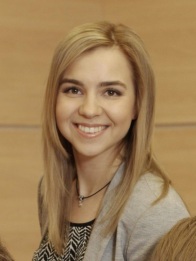Becoming an Exchange Student is Easy
Olga Okulova, Director of the International Office at the HSE in St. Petersburg, spoke with the HSE news service about the university’s student exchange programme, as well as about the HSE’s partners, international projects and the future plans of the International Office.
 Olga Okulova, Director of the International Office at the HSE in St. Petersburg, spoke with the HSE news service about the university’s student exchange programme, as well as about the HSE’s partners, international projects and the future plans of the International Office.
Olga Okulova, Director of the International Office at the HSE in St. Petersburg, spoke with the HSE news service about the university’s student exchange programme, as well as about the HSE’s partners, international projects and the future plans of the International Office.
— What opportunities does the International Office offer to HSE students?
— We do our best to offer them educational programmes that can be useful for their professional development. Today students can take part in semester exchange programmes at our partner universities, as well as participate in ‘Informal Russia’, our new programme of cross-cultural exchange for Russian and foreign students. We are always ready to talk to students about participating in summer schools or full-study programmes. We also invite leading international professors to deliver lectures.
— Could you please tell us about some of the projects at the International Office?
— Regarding our successful projects, I would mention International Week, which we organized in February 2014. Students from Norway, Austria, and Germany participated in the event, and many HSE students worked as volunteers. During the event, students attended open lectures and went sightseeing. Such student projects help the HSE develop institutional relations with foreign universities.
— What about the HSE’s partners?
— The HSE St. Petersburg currently works with 14 foreign universities, and we are planning to increase this number. We cooperate with universities in Slovakia, Poland, France, Finland, Czech Republic, Germany, Hungary, Sweden, and Austria. We are currently engaged in discussions with five foreign universities about exchange programme agreements.
— What should students do in order to participate in an exchange programme?
— First of all, they should decide where to go, and consult their academic supervisor if they have already been working on a thesis. Then they should prepare all the necessary documents. There are a few requirements for students, such as high ranking, strong performance, fluent English, and active participation in student life. Participation in international conferences and special events like the International Week is also beneficial.
— What advice would you give to students who are going to study abroad? What should they pay attention to?
— They shouldn’t be afraid of applying to exchange programmes. If they do not succeed the first time, the next time they will definitely succeed. They should also pay attention to their knowledge of English. Students who return from abroad confirm that it’s really difficult to study in a foreign language, and one should be ready for that. I would advise prospective participants to attend courses in English and choose disciplines taught in English; this will help them test their skills before going abroad. It may seem difficult at first, but in the end, it will turn out to be very interesting.
We also invite foreign students to study at the HSE St. Petersburg, as all students share their experience, which is useful and rewarding for our lecturers and students.
— What are your future plans for cooperation?
— We are planning to enroll more foreign students and lecturers. Beginning in September 2014, four foreign professors will start lecturing in the Faculty of History. We are also planning to arrange more guest lectures, international programmes in English, and double degree programmes.
By Julia Medvedeva

